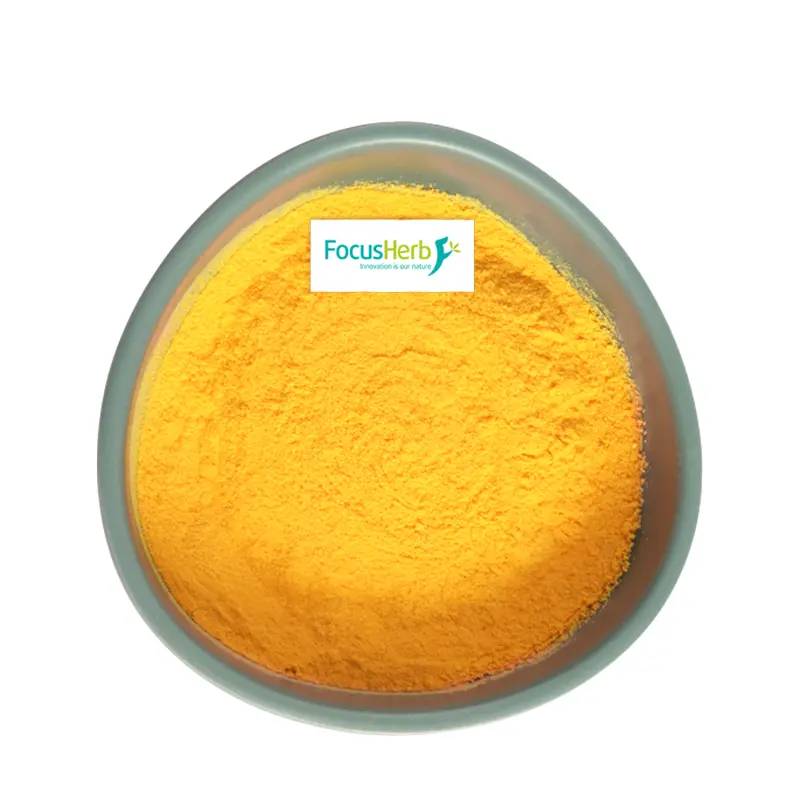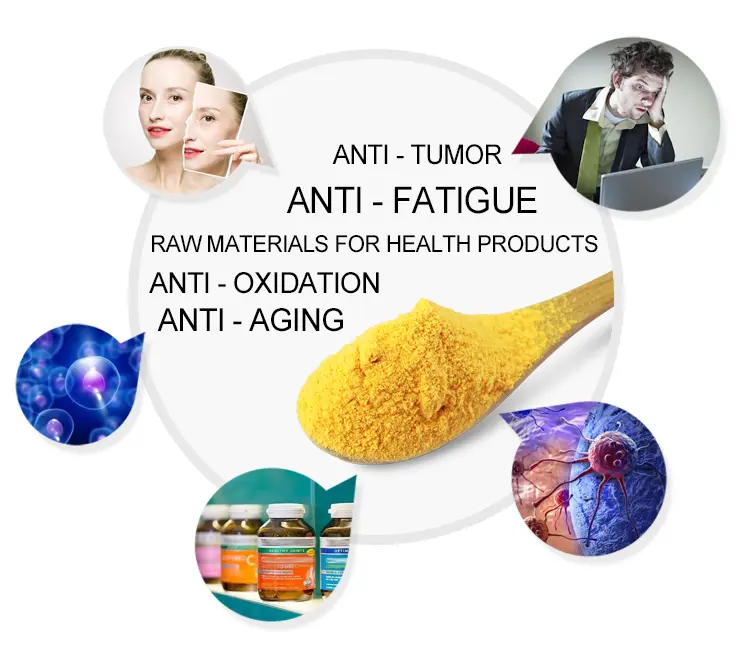Coenzyme Q10 (Coenzyme Q10), also known as ubiquinone 10, is a fat-soluble quinone compound widely found in the human body. Its chemical structure, named for its quinone-like structure, is similar to that of vitamin K, vitamin E, and plastoquinone, and is therefore considered a vitamin-like substance. It is found in every cell of the human body and is particularly abundant in organs with high energy demands, such as the heart, liver, kidneys, and pancreas. Within cells, Coenzyme Q10 is primarily concentrated in the mitochondria, the core site of cellular energy metabolism, accounting for approximately 45%-50% of the total intracellular Coenzyme Q10. The lowest concentration is in the cytoplasm, at only 5%-10%.
The human body has the ability to synthesize Coenzyme Q10, primarily in the mitochondria. This synthesis involves the participation of multiple enzymes and cofactors, and its production is relatively high in metabolically active organs. Diet is also an important way to obtain Coenzyme Q10. It is naturally present in many foods, including fish like sardines and saury, meats like beef and chicken, nuts like peanuts and walnuts, and some leafy green vegetables like spinach and broccoli. However, with aging, the body’s ability to synthesize Coenzyme Q10 gradually decreases. Combined with the influence of certain medical conditions, this can lead to insufficient levels of Coenzyme Q10 in the body, necessitating supplementation to meet the body’s needs.
The Role of Coenzyme Q10

The Core of Energy Production
In the mitochondria of cells, Coenzyme Q10 is a core player in energy production. The cellular respiratory chain is a key pathway for cellular energy production, and Coenzyme Q10, as a crucial component, participates in the process of oxidative phosphorylation. It acts like an “energy carrier,” transporting electrons in the respiratory chain and facilitating the transport of hydrogen ions from the mitochondrial matrix across the membrane into the intermembrane space, thereby driving the phosphorylation of adenosine diphosphate (ADP) to produce adenosine triphosphate (ATP). ATP is the direct source of cellular energy, powering various cellular activities such as muscle contraction, substance synthesis, and ion transport. Cardiac muscle cells require a continuous and substantial amount of energy to maintain the rhythmic beating of the heart. Coenzyme Q10 plays a particularly crucial role in this process, ensuring an adequate energy supply for cardiomyocytes and maintaining the heart’s normal pumping function.
Powerful Antioxidant Potency
Coenzyme Q10 is a powerful antioxidant. The human body continuously produces free radicals during normal metabolic processes. External factors such as environmental pollution, ultraviolet radiation, and mental stress can also contribute to free radical production. Excessive free radicals attack lipids, proteins, and DNA within cells, causing oxidative stress damage, which in turn contributes to aging and various chronic diseases. Coenzyme Q10 neutralizes these free radicals by directly donating electrons to reduce them, thereby reducing the damage caused by oxidative stress to cells. Furthermore, Coenzyme Q10 promotes the regeneration of other antioxidants, such as vitamin E, synergistically enhancing cells’ antioxidant defenses, protecting the integrity of cell structure and function, and slowing the aging process. It also has positive implications for preventing cardiovascular disease and neurodegenerative diseases.
Protecting Heart Health
Clinical studies have shown that Coenzyme Q10 has a significant positive impact on heart health. For patients with heart failure, supplementing with Coenzyme Q10 can help improve cardiac function, alleviate symptoms such as shortness of breath, fatigue, and edema, and improve quality of life. In a study of patients with heart failure, those who took Coenzyme Q10 supplements showed a significant increase in ejection fraction and enhanced cardiac pumping capacity over time. For patients with arrhythmias, Coenzyme Q10 can also play a regulatory role, stabilizing myocardial membrane potential and reducing the frequency of arrhythmias. Its antioxidant properties can also reduce oxidative damage to vascular endothelial cells, promote the release of nitric oxide, and promote vasodilation, thereby helping to lower blood pressure, reduce cardiac afterload, and reduce the risk of cardiovascular disease. Statins are commonly used clinically to lower blood lipids, but long-term use may cause a decrease in Coenzyme Q10 levels in the body. Supplementing with Coenzyme Q10 can mitigate this side effect of statins to a certain extent and protect heart function.
Other Health Benefits
Coenzyme Q10 also plays a positive role in skin health. With aging, the amount of Coenzyme Q10 in the skin gradually decreases, slowing skin metabolism and leading to wrinkles, sagging, and dullness. Coenzyme Q10 can promote energy metabolism in skin cells, accelerate cell renewal, increase the synthesis of hyaluronic acid in the skin, improve skin hydration, maintain smoothness and elasticity, and reduce the appearance of wrinkles. Coenzyme Q10 is added to many skincare products to help improve skin texture and slow down aging. Coenzyme Q10 can also enhance the activity of immune cells such as T cells, B cells, and macrophages, promote the production of immunoglobulins, help the body better defend against invading pathogens, strengthen the body’s immune system, and, to a certain extent, prevent illnesses such as colds and the flu. For people who often feel tired, supplementing with coenzyme Q10 can improve the efficiency of cellular energy metabolism, increase energy supply, reduce physical fatigue, and allow people to maintain more energy. Athletes and people engaged in high-intensity physical labor can take appropriate amounts of coenzyme Q10 to help improve athletic performance and reduce post-exercise fatigue and muscle damage.
Suitable Patients for Coenzyme Q10
Heart Disease Patients
Coenzyme Q10 is an important candidate for patients with various heart diseases. Heart failure patients experience weakened cardiac pumping function and impaired cardiomyocyte energy metabolism. Coenzyme Q10 can boost cardiomyocyte energy supply, enhance myocardial contractility, improve cardiac pumping function, alleviate heart failure symptoms, and improve patients’ quality of life. Studies have shown that supplementing with Coenzyme Q10 in addition to conventional treatment can improve exercise tolerance and alleviate symptoms such as dyspnea in patients with heart failure. For patients with coronary artery disease, Coenzyme Q10 not only increases myocardial blood supply but also, through its antioxidant properties, reduces damage to vascular endothelial cells, inhibits the formation and progression of atherosclerotic plaques, and reduces the risk of coronary heart attacks. For patients with arrhythmias, Coenzyme Q10 can stabilize myocardial membrane potential, regulate cardiac electrophysiological activity, reduce the frequency of arrhythmias, and maintain normal heart rhythm. Elderly People
With aging, the body’s ability to synthesize Coenzyme Q10 gradually declines, and Coenzyme Q10 levels in the body decrease accordingly. For those over 60, Coenzyme Q10 levels may be 20%-50% lower than in younger people. Reduced Coenzyme Q10 levels can affect cellular energy metabolism and antioxidant defenses, leading to decreased bodily functions, weakened immunity, and increased susceptibility to disease. Supplementing with Coenzyme Q10 can help older adults maintain normal cellular function, slow the aging process of various organs, enhance their immune system, and prevent and alleviate many common age-related illnesses, such as cardiovascular disease and neurodegenerative diseases, thereby maintaining a better physical condition and quality of life.
Athletes and Manual Laborers
During intense training and competition, athletes, as well as manual laborers engaged in strenuous physical labor, experience significantly increased energy demands and heightened cellular metabolic activity, leading to significant Coenzyme Q10 consumption. If Coenzyme Q10 isn’t replenished promptly, it can lead to fatigue and lack of energy, impairing athletic performance and work efficiency, and potentially increasing the risk of sports injuries. Supplementing with Coenzyme Q10 can accelerate cellular energy metabolism, rapidly replenish energy, enhance muscle endurance and strength, reduce fatigue, and promote recovery. Studies have found that athletes who supplement with Coenzyme Q10 experience significantly less fatigue and less muscle soreness after exercise, and shorten their recovery time, allowing them to return to their next training session or competition more quickly.
People with Weak Immunities
Coenzyme Q10 also plays a crucial role for people with weakened immune systems, such as those who frequently catch colds, tire easily, or have slow wound healing. Coenzyme Q10’s antioxidant properties can scavenge excess free radicals in the body, reducing oxidative stress damage to immune cells and maintaining their normal function. It also enhances the activity of immune cells such as T cells, B cells, and macrophages, promoting the synthesis and secretion of immunoglobulins, thereby boosting the body’s overall immunity, helping the body better defend against invading pathogens such as bacteria and viruses, and preventing and reducing the incidence of disease. Office workers under long-term high-stress environments and those with irregular lifestyles, whose immune function is easily compromised, are also suitable candidates for Coenzyme Q10 supplementation to boost immunity.
Patients with Special Diseases
Hepatitis patients, whether viral or drug-induced, experience varying degrees of liver cell damage, impairing their energy metabolism and detoxification functions. Coenzyme Q10 can promote liver cell energy metabolism, enhance liver cell repair, reduce inflammation, and protect liver cells from further damage, helping to improve liver function and promote recovery. When cancer patients undergo chemotherapy and radiotherapy, the drugs, while killing cancer cells, can also damage normal cells, leading to a range of adverse reactions such as fatigue, nausea, vomiting, and decreased immunity. Furthermore, chemotherapy and radiotherapy deplete significant amounts of Coenzyme Q10 in the body. Supplementing with coenzyme Q10 can reduce the damage caused by chemotherapy and radiotherapy to normal cells in the body, relieve adverse reactions such as fatigue and nausea caused by chemotherapy and radiotherapy, improve the patient’s quality of life and tolerance to chemotherapy and radiotherapy, and assist patients in better completing the treatment process.
Coenzyme Q10 Side Effects and Precautions
Common Side Effects
Coenzyme Q10 is generally safe, but some people may experience some side effects.
Gastrointestinal side effects are common, including nausea, vomiting, diarrhea, stomach discomfort, and loss of appetite. These symptoms often occur during the initial phase of Coenzyme Q10 use, especially when a high single dose is taken. This is primarily due to Coenzyme Q10 irritating the gastrointestinal lining, affecting normal gastrointestinal motility and digestive juice secretion. For example, some people experience stomach bloating, dull pain, nausea, nausea, and vomiting after taking Coenzyme Q10 supplements. In severe cases, diarrhea may also occur. However, these symptoms are generally mild, and most people gradually adapt to the effects after continued use, and the symptoms resolve on their own. To alleviate gastrointestinal discomfort, it is recommended to take Coenzyme Q10 after meals. Food can act as a buffer, reducing direct irritation to the gastrointestinal tract. Alternatively, the daily dose can be divided into several smaller doses. A small number of people may experience heart symptoms such as palpitations and heart palpitations after taking Coenzyme Q10. This may be because Coenzyme Q10 affects the heart’s electrical activity, leading to changes in the excitability and conductivity of cardiomyocytes. If palpitations or heart palpitations occur, stop taking Coenzyme Q10 immediately and seek medical attention for an electrocardiogram or other tests to determine the cause of the symptoms. If Coenzyme Q10 is confirmed to be the cause, the doctor will adjust the medication regimen based on the individual’s circumstances, such as reducing the dosage or switching to a different medication. Maintaining healthy lifestyle habits, such as avoiding late nights, excessive exertion, reducing caffeine intake, and engaging in moderate exercise, can help alleviate palpitations.
Some people with allergies may be allergic to Coenzyme Q10 or certain excipients in its preparations, resulting in skin reactions such as rashes, itching, and erythema. In severe cases, these reactions may also be accompanied by systemic allergic reactions such as difficulty breathing and laryngeal edema. If allergic symptoms occur, stop using Coenzyme Q10 immediately and seek medical attention as soon as possible. Under a doctor’s guidance, seek anti-allergic treatment, such as antihistamines (loratadine, cetirizine, etc.). Before using Coenzyme Q10 again, be sure to inform your doctor of your allergy history to avoid recurring allergic reactions.
Precautions
Although Coenzyme Q10 has many health benefits, its use requires strict adherence to a doctor’s instructions. It should not replace regular medical treatment, especially for patients with serious illnesses such as heart failure, coronary artery disease, and cancer. Coenzyme Q10 should only be used as an adjunct treatment and should be used under a doctor’s comprehensive evaluation and guidance. Blindly taking Coenzyme Q10 may not achieve the desired therapeutic effect and may even delay recovery. For example, patients with heart failure should strictly follow their doctor’s prescribed treatment plan while taking Coenzyme Q10, taking cardiotonic, diuretic, and vasodilator medications on schedule, and seeking regular follow-up visits to adjust their treatment plan based on changes in their condition. Long-term Coenzyme Q10 users should regularly check their liver and kidney function. Because Coenzyme Q10 is primarily metabolized in the liver and excreted through the kidneys, long-term or excessive use can burden the liver and kidneys, potentially affecting their function. It is generally recommended to have liver and kidney function tests every 3-6 months to detect potential problems. If test results indicate abnormalities in liver and kidney function, notify your doctor immediately. The doctor will determine whether to adjust the Coenzyme Q10 dosage or discontinue the Coenzyme Q10 treatment based on the individual situation.
While taking Coenzyme Q10, do not increase or decrease the dosage on your own. Increasing the dosage at random may increase the risk of side effects. For example, overdose may cause asymptomatic elevations in lactate dehydrogenase and aspartate aminotransferase levels, and in rare cases, mild itching. Increasing the dosage at random may also fail to achieve effective therapeutic concentrations, potentially compromising treatment effectiveness. Any dosage adjustment should be made under the guidance of a doctor, who will make a comprehensive assessment based on multiple factors, including the patient’s age, weight, severity of illness, and response to the medication, and provide an appropriate adjustment plan.
Proper Coenzyme Q10 Supplementation
Supplementation Methods
When dietary intake is insufficient to meet the body’s Coenzyme Q10 needs, supplements or medications can be used. A wide variety of Coenzyme Q10 supplements and medications are available on the market, with common formulations including softgels, hardgels, tablets, and oral solutions. Softgels, typically made of gelatin and glycerin, effectively protect Coenzyme Q10 from oxidation, making it easier to dissolve and release in the gastrointestinal tract, and increasing Coenzyme Q10 bioavailability, making them highly popular with consumers. When choosing Coenzyme Q10 products, be sure to purchase them through reputable channels to ensure their quality and safety. Prioritize reputable and well-known brands, as these brands typically have more stringent production processes and quality control procedures, ensuring higher product quality. Also, carefully check the product’s ingredient list, production date, expiration date, and other information to avoid counterfeit, substandard, or expired products. Coenzyme Q10 is fat-soluble. To improve its absorption, it’s recommended to take it after a meal, especially with a fatty food. For example, taking Coenzyme Q10 after consuming oily foods like fish and nuts can help dissolve and absorb Coenzyme Q10 in the intestines, allowing the body to better utilize it. Generally, it’s best to take Coenzyme Q10 about half an hour after a meal. If you’re taking a Coenzyme Q10 supplement, strictly follow the recommended dosage in the product package insert and avoid increasing or decreasing the dosage at will. If you’re taking it as a medication, always follow your doctor’s prescription and instructions, and take it according to the prescribed course and dosage to ensure optimal therapeutic effects and minimize adverse reactions.
Appropriate Dosage
Coenzyme Q10 requirements vary among different populations, making appropriate supplementation dosage crucial. For healthy adults, a daily supplement of 30-100 mg of Coenzyme Q10 is generally recommended to maintain normal physiological functions and provide certain health benefits. This dosage range helps the body maintain cellular energy metabolism and antioxidant defenses, preventing health problems that may result from Coenzyme Q10 deficiency.
For patients with specific medical conditions, such as heart failure, coronary artery disease, and chronic hepatitis, the required Coenzyme Q10 dosage is often higher, typically between 100 and 300 mg/day. For patients with heart failure, for example, studies have shown that supplementing with higher doses of Coenzyme Q10 (100-200 mg/day) can significantly improve cardiac function, alleviate symptoms, and enhance quality of life. However, the specific dosage should be individually assessed and adjusted by a physician based on factors such as the severity of the patient’s condition, physical condition, and response to medication.
Older adults, due to a decline in their ability to synthesize Coenzyme Q10, have a relatively increased need for Coenzyme Q10. A daily supplement of 50-150 mg is generally recommended to maintain normal organ function and slow the aging process. Athletes and those who engage in high-intensity physical labor experience greater consumption of Coenzyme Q10 during intense exercise or labor. Therefore, increasing the supplemental dosage appropriately—100-200 mg daily is recommended—can help reduce fatigue, enhance stamina, and promote post-exercise recovery. When supplementing with Coenzyme Q10, it’s important to start with a small dose and gradually increase it to allow the body to adapt and avoid any discomfort caused by a sudden increase in dosage. Regular physical examinations should also be conducted to monitor Coenzyme Q10 levels and adjust the supplemental dosage accordingly.
Coenzyme Q10 is a vital substance for human health, demonstrating irreplaceable benefits in various areas, from supporting energy metabolism to acting as a key antioxidant defense, to supporting heart health and immunity. The elderly, those with heart disease, athletes, and those with weakened immune systems can all benefit from Coenzyme Q10 supplementation. However, when supplementing with Coenzyme Q10, we must maintain a scientific and cautious attitude, follow our doctor’s advice, properly control the dosage, pay attention to possible side effects and drug interactions, and combine it with a healthy diet and lifestyle, such as a balanced diet, moderate exercise, and a regular sleep schedule. Only in this way can Coenzyme Q10 fully exert its health benefits in our bodies and safeguard our health.





















